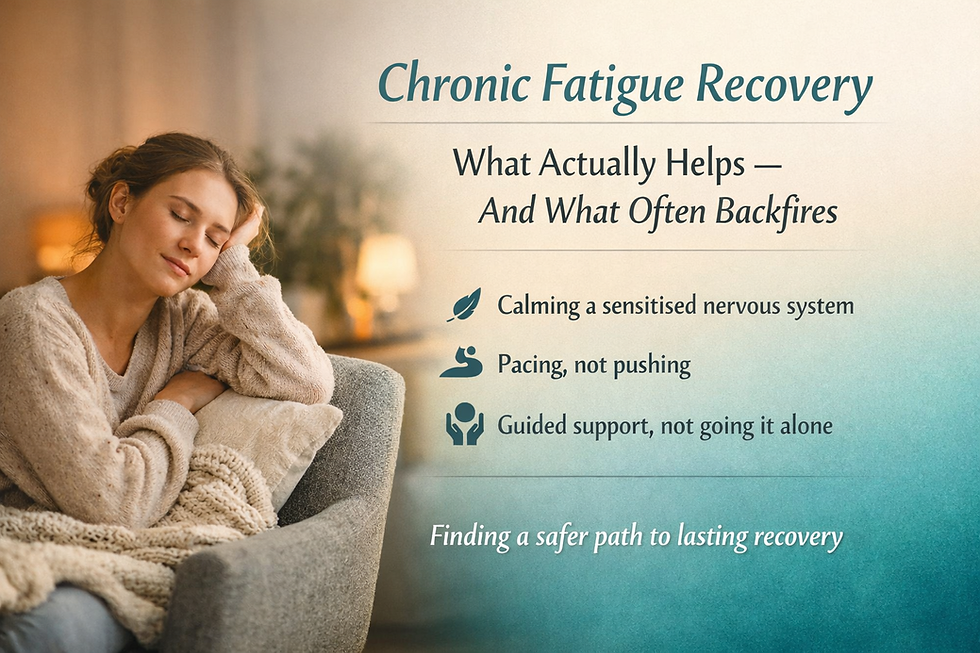Fatigue in Children and Exhaustion in Teens: A Guide for Concerned Parents
- New Pathways Programme
- May 6, 2025
- 4 min read
Updated: Jan 27

Understanding Teenage Chronic Fatigue and Chronic Fatigue Syndrome in Children
If you’re worried about your child or teen’s constant tiredness, you’re not alone.
Many parents find themselves asking:
“Why is my teenager always tired?”
“Is this just school stress — or something more?”
Fatigue in children and exhaustion in teens are increasingly common and can affect wellbeing, school life, confidence, and emotional health.
For many families, concern deepens after GP visits and reassurance that blood tests are “normal” — yet the tiredness, brain fog, or crashes continue.
This guide explains when tiredness is part of growing up, when it may signal teenage chronic fatigue or chronic fatigue syndrome (CFS) in children, and what genuinely helps recovery.
Quick answer
Quick answer: Fatigue in children and teens becomes a concern when it is persistent, worsens after activity, doesn’t improve with rest, or interferes with school and daily life. While some tiredness is normal during growth and puberty, ongoing exhaustion can reflect nervous-system overload, post-viral fatigue, or chronic fatigue patterns. With early support, pacing, and nervous-system-led recovery, most children and teens do improve.
This guide reflects the same approach I use in the New Pathways Programme, supporting children, teens and families with post-viral fatigue, CFS/ME and long COVID.
👉 Learn more about the programme here: /new-pathways-programme
What’s Normal? Fatigue in Children During Puberty
Why teens are naturally more tired
During puberty, hormonal changes shift the body’s internal clock. Teens often don’t feel sleepy until later at night, yet still need to wake early for school.
This mismatch contributes to:
chronic sleep debt
weekend “catch-up” sleep
worsening weekday exhaustion
Add academic pressure, social stress, and screen use, and many teens feel permanently tired — even when otherwise healthy.
Common Lifestyle Causes of Exhaustion in Teens
Sleep disruption and screen exposure
Evening screen use suppresses melatonin, making it harder to fall asleep and stay asleep.
Overloaded schedules
Packed timetables — school, sports, homework, social demands — leave little time for recovery.
Nutrition and activity patterns
Highly processed diets, low iron or vitamin D, and minimal gentle movement can all contribute to fatigue in children.
When to Worry: Teenage Chronic Fatigue Warning Signs
Signs tiredness may be more than “normal”
Parents should take notice if:
tiredness persists regardless of sleep
school attendance drops
small activities cause crashes
brain fog or pain increases
mood or personality changes significantly
When these patterns last weeks or months, they may point to teenage chronic fatigue or chronic fatigue syndrome in children.
👉 If fatigue worsens after activity, read: /post/post-exertional-malaise-pem
What Is Chronic Fatigue Syndrome in Children?
Key features of CFS / ME in young people
Chronic fatigue syndrome (CFS/ME) involves:
unrelenting fatigue not relieved by rest
post-exertional malaise (crashes after effort)
cognitive difficulties (“brain fog”)
dizziness or weakness
muscle or joint pain
Children may look well but feel profoundly unwell — leading to misunderstanding and emotional strain.
👉 If thinking and concentration are affected, this may help: /post/brain-fog-and-fatigue
The Stress–Fatigue Cycle in Teens
How stress can lock fatigue in place
Ongoing stress — academic pressure, illness, social anxiety, or bullying — can keep the nervous system stuck in “high alert”.
Over time, this:
drains energy reserves
disrupts sleep and digestion
increases sensitivity to effort
Fatigue then becomes self-reinforcing unless the system is helped to calm and reset.
Medical and Post-Viral Causes to Rule Out
Conditions your GP may check
Before diagnosing CFS, doctors often rule out:
anaemia
thyroid conditions
vitamin deficiencies
sleep disorders
anxiety or depression
post-viral fatigue after infections (including COVID-19)
👉 If tests are normal but fatigue persists, read: /post/fatigue-but-normal-blood-tests
Supporting Your Teen Through Teenage Chronic Fatigue
1. Validate their experience
Belief and reassurance reduce stress and build trust.
2. Use pacing, not pushing
Balance activity and rest before symptoms spike.
3. Encourage gentle movement
Light stretching or walking can help when tolerated.
4. Reduce academic pressure
Shortened days or flexible learning often support recovery.
5. Create calm routines
Predictable rhythms help regulate the nervous system.
What Doesn’t Help (and Often Makes Things Worse)
pushing through fatigue
forcing exercise
waiting until crashes before resting
minimising symptoms
constant symptom monitoring
assuming it’s “just motivation”
The New Pathways Approach for Children and Teens
At New Pathways, we support recovery by helping young people:
calm the nervous system
break stress–fatigue cycles
rebuild confidence and capacity
return to school and life gradually
👉 Read family experiences here: /success-stories
Common Questions Parents Ask
Is chronic fatigue syndrome reversible in children?
In many cases, yes — especially with early, supportive intervention.
Should my child exercise?
Only gently and gradually, once the system is stabilised.
Is this anxiety?
Anxiety can co-exist, but fatigue is not “just anxiety”.
When to Seek Specialist Support
Consider specialist guidance if:
fatigue lasts more than a few weeks
school becomes unmanageable
crashes occur after small efforts
your child seems stuck or distressed
👉 Book a free 20-minute clarity call here: /book-online
Written by Steve Fawdry
Fatigue recovery specialist and creator of the New Pathways Programme, supporting adults, teens and families with post-viral fatigue, Long COVID and chronic fatigue-type symptoms.


